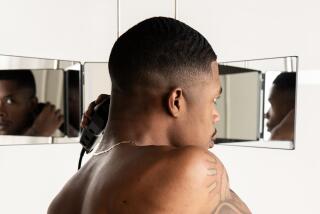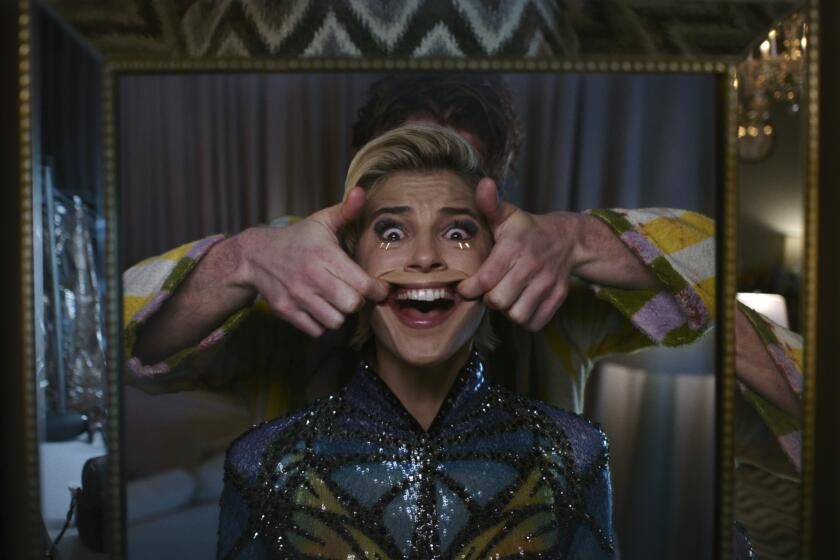Patrons at Real-Life Barbershop Have No Problem With Movie
All I did was ask Lawrence Tolliver what the reaction was at his barbershop on Florence near Western Avenue.
“Wait a minute,” Mr. Tolliver responded, holding the phone out.
On the count of 3, everyone in the shop cursed the Rev. Jesse Jackson.
For those who missed the news, Jackson and the Rev. Al Sharpton demanded an apology from MGM for irreverent references to the Rev. Martin Luther King Jr. and other black leaders in the hit movie “Barbershop.”
Must be slow times in the rabble-rousing business.
When I arrived at Mr. Tolliver’s clip joint, Allen Humphries, a retired police sergeant, was the first to speak.
“There’s nothing in here that can’t be talked about,” he said, explaining the essence of barbershop culture.
“That’s right. Ain’t nothing sacred,” echoed Mr. Tolliver, whose shop walls have black-and-white photos of him meeting Rosa Parks and Nelson Mandela.
“There’s some things we don’t say in front of white folks,” Tony Wafford, an AIDS prevention counselor, said for qualification. “We just give [you] a free pass.”
He might have been referring to a scene in the movie in which a black barber, who plays the shop agitator, says there are three things black people are going to have to fess up to:
1. Rodney King deserved a beating for driving drunk, and for being in a Hyundai.
2. O.J. did it.
3. Rosa Parks didn’t do anything but sit down on a bus.
In the movie, the barbershop erupts in condemnation, even though the agitator’s point about Rosa Parks is that lots of black people went to jail for standing up to injustice, and no one knows their names.
One insulted customer asks what Jesse Jackson would say about such heresy, but the agitator gives no ground.
“[Blank] Jesse Jackson,” he says.
No wonder Jackson’s in a lather. Besides, the agitator calls Martin Luther King Jr. a womanizer, and it wasn’t that long ago that Jackson was hanging his head over the revelation that he has a love child.
“Black people are not monolithic in the way we think,” Humphries said.
If Jackson doesn’t know about the back-and-forth at a neighborhood barbershop, Mr. Tolliver said, there might be a good reason.
Mr. Tolliver, a natty, bearded gent who’s been perfecting his art for 40 years, said Jackson’s entourage summoned him on two occasions while visiting Los Angeles, asking that he please hurry over and perform “my tonsorial services.”
At the Roosevelt Hotel in Hollywood, Mr. Tolliver cut hair for Jackson’s staff. The second time, he cleaned up Jackson himself at the downtown Biltmore.
“Can he come to the barbershop? No,” Mr. Tolliver sassed. “He’s too busy.”
He said he had to wait 90 minutes before he cut Jackson’s hair in some fancy room called the “Music Suite.”
“If he’d been in this barbershop, he would have known what goes on.”
“Al Sharpton ain’t been in no barbershop neither,” Wafford said, suggesting that Sharpton must be getting his cool-whip “do” at a salon. “Brother’s got all that [stuff] on his head that’s been out of style since ‘Superfly.’ ”
What bothers Kendric Rollins, an attorney, is that there’s finally a movie in which black people aren’t shooting each other and selling drugs every day of their lives, and it gets attacked by so-called black leaders.
“We do get shot,” he said, “but not every day.”
“Barbershop” was made by black producers, Rollins said, it’s got a black cast, it’s a box-office sensation for its portrayal of a black social institution, and Jackson’s got a problem?
“My question is, who named Jesse Jackson as my leader?” Wafford asked. “Because I didn’t get no ballot.”
“There are greater causes we need to shine a light on,” Mr. Tolliver agreed. “We got a president who wants to go to war, and 30% of the soldiers are black people.”
“It ain’t his kids goin’,” Wafford echoed. “They’re out smokin’ weed and drinkin’ liquor.”
“This is the same Jesse Jackson who went to the Academy Awards and complained there’s not enough black people behind and in front of the camera,” Humphries said, worrying that studios will take a pass on future black movies so they don’t get blindsided by Jackson and Sharpton, who have threatened boycotts.
Kevin Hooks, an entertainment marketing executive, said that won’t happen. “The studios see only one thing,” he said, and everyone responded in unison:
“MONEY!”
Speaking of which, I offered to do my part by taking the whole barbershop to the movie.
“Let’s go,” Mr. Tolliver said after shaping his last customer’s head. He hadn’t seen “Barbershop” yet.
Tony Wafford said we should go to the Bridge, where he saw it the first time, so we’d be able to hear the movie.
“Black people like to give feedback,” he said. “You ain’t going to hear nothing at the Magic Johnson Theatres.”
We went there anyway. I sat next to Mr. Tolliver, who wasn’t bothered by the so-called controversial scenes, but he wasn’t ready to nominate the movie for an Oscar, either.
The real thing is hard to top.
*
Steve Lopez writes Sunday, Wednesday and Friday. Reach him at [email protected].
More to Read
Only good movies
Get the Indie Focus newsletter, Mark Olsen's weekly guide to the world of cinema.
You may occasionally receive promotional content from the Los Angeles Times.











